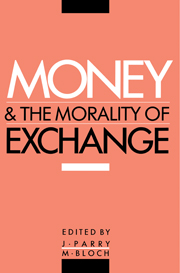Book contents
- Frontmatter
- Contents
- List of contributors
- 1 Introduction: Money and the morality of exchange
- 2 Misconceiving the grain heap: a critique of the concept of the Indian jajmani system
- 3 On the moral perils of exchange
- 4 Money, men and women
- 5 Cooking money: gender and the symbolic transformation of means of exchange in a Malay fishing community
- 6 Drinking cash: the purification of money through ceremonial exchange in Fiji
- 7 The symbolism of money in Imerina
- 8 Resistance to the present by the past: mediums and money in Zimbabwe
- 9 Precious metals in the Andean moral economy
- 10 The earth and the state: the sources and meanings of money in Northern Potosí, Bolivia
- Index
10 - The earth and the state: the sources and meanings of money in Northern Potosí, Bolivia
Published online by Cambridge University Press: 20 February 2010
- Frontmatter
- Contents
- List of contributors
- 1 Introduction: Money and the morality of exchange
- 2 Misconceiving the grain heap: a critique of the concept of the Indian jajmani system
- 3 On the moral perils of exchange
- 4 Money, men and women
- 5 Cooking money: gender and the symbolic transformation of means of exchange in a Malay fishing community
- 6 Drinking cash: the purification of money through ceremonial exchange in Fiji
- 7 The symbolism of money in Imerina
- 8 Resistance to the present by the past: mediums and money in Zimbabwe
- 9 Precious metals in the Andean moral economy
- 10 The earth and the state: the sources and meanings of money in Northern Potosí, Bolivia
- Index
Summary
The patron saint of the tin-mining centre of Llallagua is the Virgin of the Assumption. Her annual feast is celebrated on 15 August by extraordinary processions of dancers through the streets, which seem to defy the human condition by their hours of intense physical exertion and heavy drinking, in the hot sun at an altitude of some 12,000 ft. In 1983, after two days watching the dancers, I met up with a group of Laymi men who were preparing to return home to their villages some eight hours' walk away.
It was eight o'clock in the morning and they were pouring libations in the spirit of the preceding festival, as well as to ask protection for the journey home. With my arrival more cheap rum (alcool de caña) was purchased and we began a new round of libations, starting in the proper way by drinking for God and his consort the moon, then for the mountains and for pachamama, the earth. Next, since it was her feast, we drank for the Virgin of the Assumption (mamita asunta) and the money that she brings to her worshippers. The morning wore on, the sun rose towards its zenith, we bought more rum and continued pouring libations, with greater and greater fervour, to all the divinities honoured by the local Andean population but especially to money and the sources of money. My drinking companions told me that mamita asunta's ‘husband’ was Saint Michael, and that he is the segunda mayor of the mine (the term is that used in Northern Potosí for the highest-ranking indigenous authority).
- Type
- Chapter
- Information
- Money and the Morality of Exchange , pp. 232 - 268Publisher: Cambridge University PressPrint publication year: 1989
- 52
- Cited by



